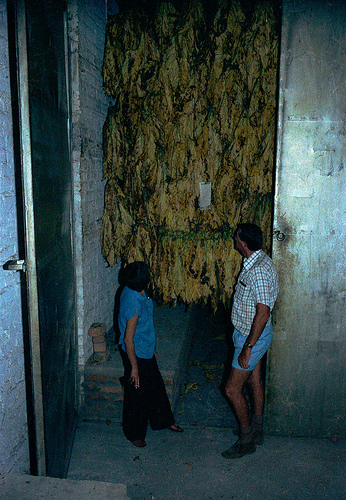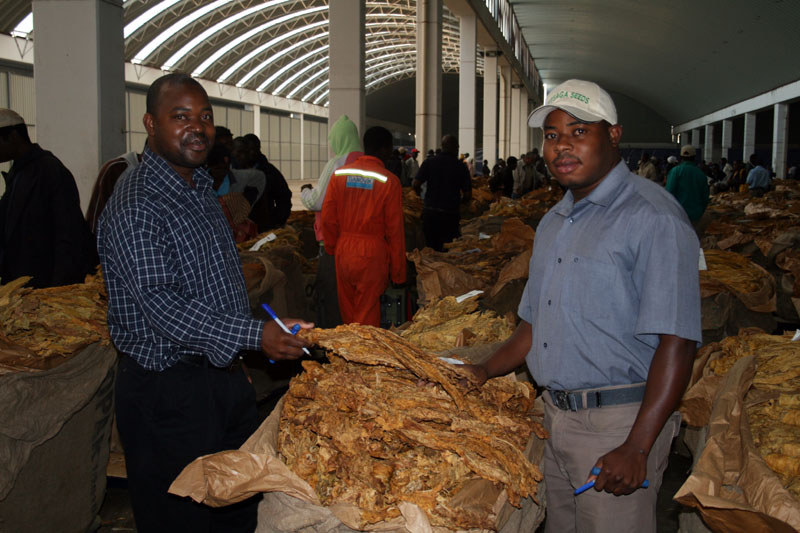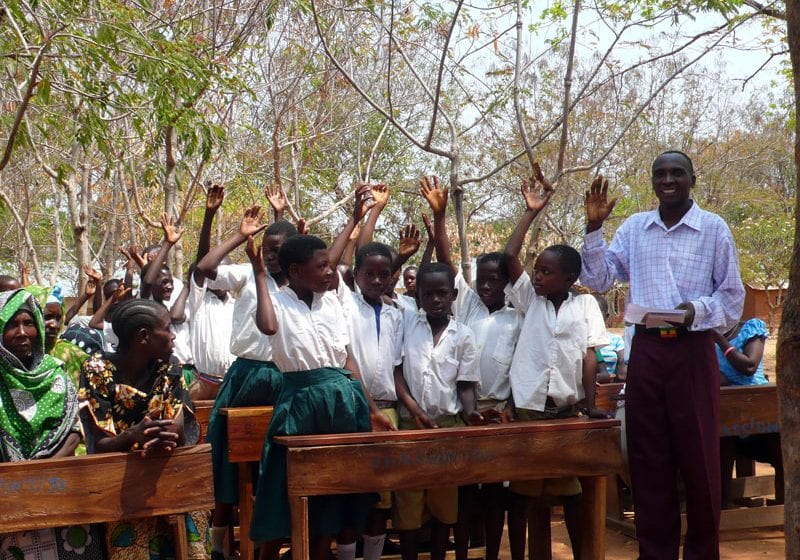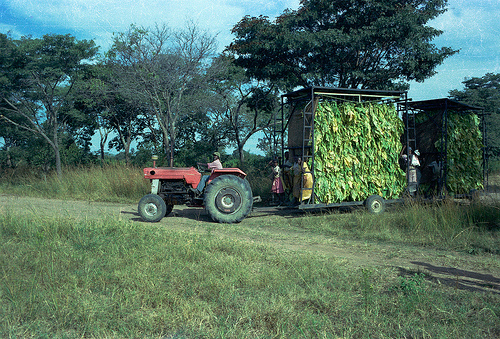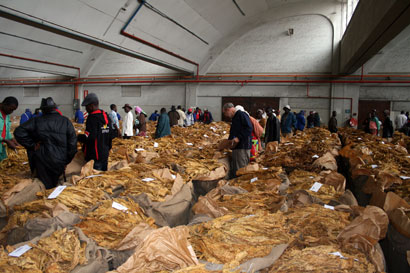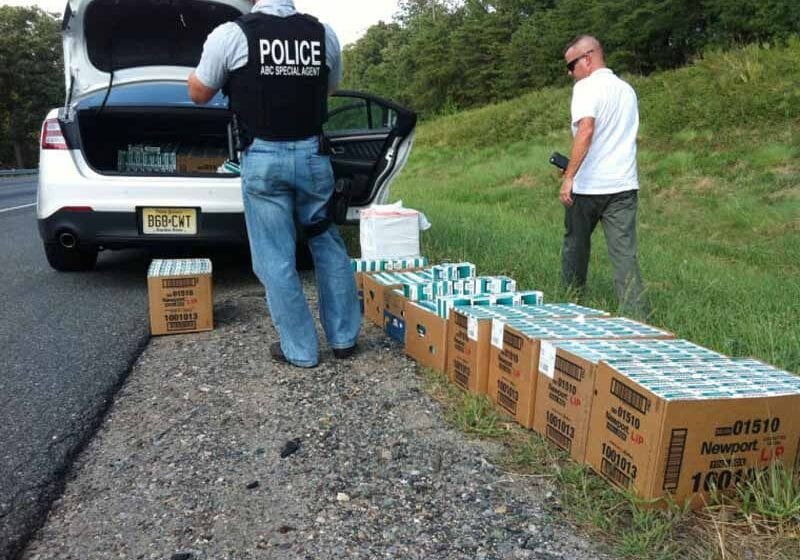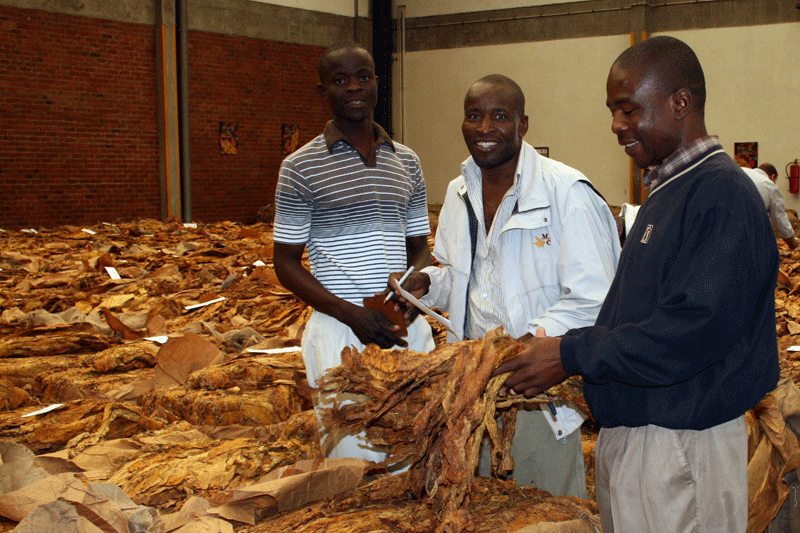Flue-cured tobacco deliveries to Zimbabwe’s auction floors have increased, partly because growers need to raise money for their children’s school fees, according to a story by Elita Chikwati for the Herald.
Boka Tobacco Floors’ operations manager Moses Bias, who confirmed that deliveries to the auction floors had firmed, said that this was a normal trend as schools opened.
“We used to receive an average of 1,700 bales per day during the first days, but now we are getting an average of 6,000 bales per day,” he said.
Bias said the season was going well and that there had not been any challenges with prices.
The Herald story said that growers had sold about 45 million kg of flue cured tobacco for about $125 million, an average price of $2.79 per kg.
As has become normal practice, no indication was given of how this average compares with that of last season.
However, with 70 million kg sold during the 2017 season, the average price stood at 2.76 per kg; and with 60 million kg sold during the 2016 season, the average price stood at US$2.82 per kg.
The highest price paid so far this season at auction was said to have ‘remained’ on US$4.99 per kg, while contract prices had gone beyond US$5 per kg.
The highest contract price paid during the first 30 days of the 2016 selling season was US$6.25 per kg, whereas the highest auction price was US$4.99 per kg.
Tag: Zimbabwe

Sales picking up

Flue-cured prices increased
The average grower price for flue-cured tobacco during the first nine days of Zimbabwe’s 2018 marketing season was up by nearly 13 percent on that of the comparable period of the 2017 season, according to a Bulawayo24 story citing figures from a Tobacco Industry and Marketing Board report.
Growers were said to have grossed US$25.8 million from the sale of 8.9 million kg of flue-cured delivered nine days into the 2018 marketing season.
By the same stage of the 2017 season, they had grossed US$26.6 million from the sale of 10.4 million kg.
Contract sales this year have earned US$21.0 million from the sale of about 7.0 million kg, for an average price of US$3.01 per kg.
Meanwhile, auction sales this year have earned US$4.6 million from the sale of 1.9 million kg, for an average price of US$2.42 per kg.
Experts have forecast tobacco output of 200 million kg this year on plantings down from 110,518 ha last season to 104,397 ha this season.
Cry for action on child labor
The global watchdog, Human Rights Watch (HRW), has urged Zimbabwe to take urgent steps to stem child labor and other rights abuses on the country’s tobacco farms, according to a story in The Business Daily.
In a report entitled, Bitter Harvest: Child Labor and Human Rights Abuses on Tobacco Farms in Zimbabwe, the HRW revealed that children as young as 11 were working on tobacco farms, often in hazardous conditions, to earn school fees or supplement family incomes.
Workers were said to be exposed to nicotine and toxic pesticides, and to suffer symptoms consistent with poisoning, such as nausea and vomiting.
“Zimbabwe’s government needs to take urgent steps to protect tobacco workers,” said Margaret Wurth, co-author of the report.
The Business Day reported seasonal workers on some large-scale farms as saying they were pushed to work excessive hours without overtime and forced to go weeks or months without pay.
HRW called on the government to investigate and monitor child labor and human rights violations on tobacco farms.
President Emmerson Mnangagwa has promised to prioritize agriculture as he looks to revive Zimbabwe’s moribund economy.
The HRW report is at: https://www.hrw.org/report/2018/04/05/bitter-harvest/child-labor-and-human-rights-abuses-tobacco-farms-zimbabwe
More labor issues coming
In a report scheduled to be made public on April 5 in Harare, Zimbabwe, Human Rights Watch (HRW) is expected to highlight ‘abusive practices such as hazardous child labor and the exposure of insufficiently-informed tobacco farmers and workers to nicotine poisoning,’ according to a story in New Zimbabwe relayed by the TMA.
HRW is an international non-governmental organization that conducts research and advocacy on human rights.
It reportedly told New Zimbabwe that families involved in tobacco cultivation were vulnerable to nicotine poisoning and abuse, adding ‘[o]ur research revealed an industry fuelled by impoverished small-scale farmers and vulnerable workers – including young child workers – who need greater protection from Zimbabwean authorities and tobacco companies’.
The report, authored by Margaret Wurth, HRW researcher in the Children’s Rights Division, found that adults and children who were interviewed reported symptoms consistent with nicotine poisoning such as nausea, vomiting, headaches and dizziness.
And it found evidence of ‘excessive working hours without overtime compensation on large-scale farms, and problems with wages, including having their wages withheld or delayed, and or being paid less than they were owed’.
Zimbabwe’s sales open
Zimbabwe’s 2018 flue-cured-tobacco marketing-season started on a ‘high note’ with the opening price of US$4.99 per kg about 8.5 percent higher than that of the previous year, according to a story in the Daily News.
However, the average price on the first day of sales, at US$2.22 per kg, was less than one percent up on that of the previous season, US$2.20 per kg.
During the whole of the 2017 selling season, the average grower price for flue-cured in Zimbabwe, at US$2.96 per kg, was lower than it was in 2009, US$2.98 per kg.
In 1996, the average price was US$2.94 per kg; so, in 21 years, the price rose by 0.6 percent.
The lowest price on the first day of this year’s sales was US$0.30 per kg.
The sales volume on the first day, at 156,000 kg, was down on that of the first day of the 2017 season, 192,000 kg.
Flue-cured market opens
Zimbabwe’s flue-cured-tobacco growers were said to be in upbeat mood ahead of the opening of the 2018 sales season, but history is not on their side.
The average grower price for flue-cured in Zimbabwe in 2016, at US$2.95 per kg, was lower than it was in 2009, US$2.98 per kg. Last year, the average price was thought to have been about US$2.96 per kg.
In only two of the seven years from 2009 to 2015 was the price lower than it was in 2016: in 2010, when it was US$2.88 per kg, and in 2009, when it was US$2.73 per kg.
In 1996, the average price was US$2.94 per kg.
According to a story in The Chronicle, Zimbabwe’s flue-cured-tobacco auctions were due to open today, while contract sales are scheduled to begin tomorrow.
Zimbabwe National Farmers Union director, Edward Dune, was quoted as saying that tobacco farmers were upbeat in terms of their expectations.
“We are expecting better prices and hopefully the Reserve Bank of Zimbabwe will pay part of our money in foreign currency,” he said
Dune urged farmers to send their crop estimates on time and book before delivering their crop for sale to avoid congestion at the floors.
“We also welcome the decentralization efforts by some contractors,” he said. “We hear that there are floors that will be operating in Rusape, Karoi and Mvurwi.
“This will definitely go a long way in reducing our production costs and ultimately also reduce congestion at the centralized floors.”
Eating the golden goose
Zimbabwe’s flue-cured-tobacco growers always complain about getting a raw deal despite their being the goose that lays the golden egg of much-needed foreign currency, according to a story by Fidelity Mhlanga for the Zimbabwe Standard.
And their concerns have been voiced yet again ahead of the opening of the 2018 tobacco marketing season on March 21.
But whether their voices will be heard is another matter. Mhlanga reported that each marketing season growers were left stranded as the authorities seemed not to address their plight.
The Federation for Farmers’ Union chairman Wonder Chabikwa reportedly said there was a need to handle carefully tobacco farmers’ welfare because they facilitated the inflow of forex into the country.
Mhlanga reported that last season the Reserve Bank of Zimbabwe (RBZ) had announced that growers would be paid [in cash] $1,000 initially, while the rest of their earnings would be deposited in bank accounts.
That never happened, leaving farmers at the mercy of ‘cash barons’ and unscrupulous traders who took advantage of the chaos by buying tobacco in cash at lower prices than those prevailing on the auction floors.
Recently, RBZ governor John Mangudya said that, upon presentation of sales statements, growers would be paid $300 per day through banks stationed at auction floors. He said the balance would be transferred into growers’ bank accounts.
The Zimbabwe Tobacco Association CEO Rodney Ambrose said small-scale farmers should be prioritised as they had not embraced plastic money.
“Therefore, farmers should once again be prioritised in their requirements for cash-based costs and foreign currency allocation for critical inputs and capital expenditure, the latter of which the RBZ has pledged to do this season.”
Economist Clemence Machadu said the rural areas where most tobacco was grown were deprived of banking infrastructure, hence the need for cash.
And Machadu said it was essential for authorities to deal decisively with bogus buyers to bring sanity to the tobacco selling procedure.
Meanwhile, the Tobacco Industry and Marketing Board (TIMB) said it was geared to stem the problem of bogus buyers this season. It had been conducting training and awareness programs for farmers; it had put in place stringent crowd control measures at the selling points and was it working closely with the Zimbabwe Republic Police and the President’s Office.
Sales season scheduled
Auction sales of Zimbabwe’s 2017-2018 flue-cured-tobacco crop are set to begin on March 21, according to a story in The Chronicle.
Bookings are due to start on March 7 and crop deliveries will be received from March 15.
The three tobacco auction floors that operated last year have been licensed again: Tobacco Sales Floor, Boka Tobacco Auction Floor, and Premier Tobacco Auction Floor.
Meanwhile, contract sales are scheduled to start on March 22.
Illegal trade ‘rampant’
Zimbabwe is in the grip of a ‘rampant’ illegal trade in cigarettes that is becoming a challenge to local cigarette companies and the economy in general, according to a story in The Herald quoting tobacco-industry sources.
The story said that illicit cigarettes were being sold on the streets for half to a third of the normal retail price, prejudicing sales in conventional shops and the country’s tax revenue.
The MD of the local arm of British American Tobacco, Clara Mlambo, said the tobacco sector was suffering from the effects of foreign currency shortages and low disposable incomes, on top of those created by the illegal trade in cigarettes.
The Herald reported that illicit cigarettes were usually sold at 50 cents a pack while the officially-gazetted average price in conventional retail outlets was $1.50.
“We have seen some products from other companies but not our brands,” said Mlambo. “They are sold so cheap on the streets, which means the consumers will buy those due to pressure on their wallets.”
Mlambo said there was a need for increased enforcement by revenue authorities to curb the challenge of the illegal trade, which was posing a threat to the licit tobacco sector.
Nevertheless, she said that BAT was optimistic about its prospects and encouraged by government initiatives aimed at improving the business environment and attracting investment into the country.
Flue-cured crop recovers
The Zimbabwe Commercial Farmers’ Union (ZCFU) says that recent rain means that flue-cured tobacco deliveries are likely to hit Zimbabwe’s target of 200 million kg this season, according to a story in The Chronicle.
This is something of a turnaround.
Last week, it was reported in The Herald that unhelpful weather had meant that flue-cured tobacco plantings were down by more than five percent this season.
The Tobacco Industry and Marketing Board (TIMB) was reported to have said that the 5.5 percent drop in tobacco hectarage had been caused by poor rainfall distribution. In its latest crop assessment report compiled with Agritex after an assessment undertaken from January 22 to February 2, the TIMB said 104,397 ha were put under tobacco this season compared to 110,518 ha last season.
But in an interview on Monday, ZCFU president Wonder Chabikwa said his organization was optimistic that the targeted 200 million kg would be achieved this selling season, which is due to begin about the middle of next month.
“We are hopeful that we will achieve our projection of 200 million kg of tobacco this selling season because of the rains that the country has received after the dry spell we experienced along the way in the 2017/18 summer cropping season,” Chabikwa was quoted as saying. “Due to the dry spell, we had lost hope that the targeted yields would be achieved.”
Last year, tobacco growers produced 189 million kg of flue-cured.
Chabikwa said irrigated tobacco was now being reaped while the rain-fed crop was at various stages of growth, with some plants developing new leaves as a result of the prevailing wet spell.

